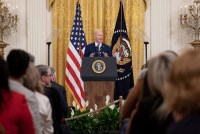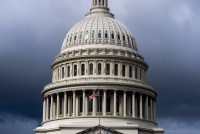Latest KFF Health News Stories
What the Health? From KFF Health News: Democrats See Opportunity in GOP Threats to Repeal Health Law
Sensing that Republicans are walking into a political minefield by threatening once again to repeal the Affordable Care Act, the Biden administration is looking to capitalize by rolling out a series of initiatives aimed at high drug prices and other consequences of “corporate greed in health care.” Meanwhile, the Supreme Court hears a case that could determine when and how much victims of the opioid crisis can collect from Purdue Pharma, the drug company that lied about how addictive its drug, OxyContin, really was. Alice Miranda Ollstein of Politico, Anna Edney of Bloomberg News, and Rachana Pradhan of KFF Health News join KFF Health News chief Washington correspondent Julie Rovner to discuss these issues and more. Also this week, Rovner interviews Dan Weissmann of KFF Health News’ sister podcast, “An Arm and a Leg,” about his investigation into hospitals suing their patients over unpaid bills.
Biden Wants States to Ensure Obamacare Plans Cover Enough Doctors and Hospitals
The regulatory proposal was announced Nov. 15 and is likely one of the last major ACA policy efforts of the president’s first term.
Biden’s Got a New Set of Orders for Obamacare. Is It His Last?
The Biden administration has issued its latest official wish list for Obamacare insurance plans, potentially one of the last major Affordable Care Act health policy efforts in the president’s first term. Changes on tap for 2025? For one, the administration wants states that run their own ACA marketplaces to crack down on what’s called “network […]
FTC Chief Gears Up for a Showdown With Private Equity
Lina Khan, chair of the FTC, says a recent lawsuit is meant to chill the consolidation of medical groups that results in higher prices for consumers. But it may be too late to curb price hikes.
Biden Administration Nibbles at the Maternal Health Crisis
Choosing where to give birth typically comes down to what hospital is most convenient to your home, where your obstetrician practices and your insurance company’s provider network. Now, the Biden administration has given expectant parents another factor to consider: whether their hospital has won the government’s new “birthing friendly” designation. But don’t worry — a […]
Biden Administration’s Limit on Drug Industry Middlemen Backfires, Pharmacists Say
A rule taking effect Jan. 1 was intended to stop one set of abuses by pharmacy benefit managers, or PBMs, but some pharmacists say it’s enabling these price brokers to simply do new things unfairly.
US to Cover HIV Prevention Drugs for Older Americans to Stem Spread of the Virus
The government has proposed that Medicare fully cover preexposure prophylaxis drugs that prevent HIV, a change that could help America catch up with nations in Europe and Africa that are on track to end new infections decades before the U.S. under its current approach.
Prevención del VIH: proponen que Medicare cubra PrEP para adultos mayores
Según el plan de la administración Biden, Medicare cubriría el costo total de los medicamentos de profilaxis previa a la exposición, que previenen la transmisión del VIH.
What the Health? From KFF Health News: For ACA Plans, It’s Time to Shop Around
It’s Obamacare open enrollment season, which means that, for people who rely on these plans for coverage, it’s time to shop around. With enhanced premium subsidies and cost-sharing assistance, consumers may find savings by switching plans. It is especially important for people who lost their coverage because of the Medicaid unwinding to investigate their options. Many qualify for assistance. Meanwhile, the countdown to Election Day is on, and Ohio’s State Issue 1 is grabbing headlines. The closely watched ballot initiative has become a testing ground for abortion-related messaging, which has been rife with misinformation. This week’s panelists are Mary Agnes Carey of KFF Health News, Jessie Hellmann of CQ Roll Call, Joanne Kenen of the Johns Hopkins Bloomberg School of Public Health and Politico, and Rachana Pradhan of KFF Health News.
Biden Pick to Lead NIH Finally Has Her Day, but Still Gets Caught Up in Drug Price Debate
Monica Bertagnolli, the president’s choice to head the National Institutes of Health, appeared before a Senate committee this week. Her confirmation has been held up by Sen. Bernie Sanders (I-Vt.), who has demanded President Joe Biden work more aggressively to lower prescription drug prices.
Covid Relief Payments Triggered Feds to Demand Money Back From Social Security Recipients
Some Social Security beneficiaries say the government is clawing back benefits after they received covid stimulus payments that were supposed to be exempt from asset limits.
Feds Hope to Cut Sepsis Deaths by Hitching Medicare Payments to Treatment Stats
A new rule sets specific treatment metrics for suspected sepsis cases in an effort to reduce deaths, but some experts say the measures could add to antibiotic overuse and need to be more flexible.
Hospitales perderán reembolsos de Medicare si no combaten mejor la mortal sepsis
La sepsis es la respuesta extrema del organismo a una infección y afecta cada año a 1,7 millones de adultos en Estados Unidos.
Trump Misplaced Blame When He Said Drug Shortages Were Biden’s Fault
Former President Donald Trump, who’s running for another term in the White House, recently blamed drug shortages on his successor, President Joe Biden. Our findings don’t align with Trump’s claims; by some measures, drug shortages increased more on Trump’s watch than on Biden’s.
Feds Rein In Use of Predictive Software That Limits Care for Medicare Advantage Patients
Software sifts through millions of medical records to match patients with similar diagnoses and characteristics and then predicts what kind of care an individual will need and for how long. New federal rules will ensure human experts are part of the process.
GOP Presidential Primary Debate No. 2: An Angry Rematch and the Same Notable No-Show
Though never framed as a marquee issue, the topic of health care crept into the chaotic seven-way faceoff throughout the evening, highlighting Republican culture-war themes.
What Happens to Health Programs if the Federal Government Shuts Down?
Medicare and Medicaid shouldn’t be affected, but confusion can be expected.
Biden Administration to Ban Medical Debt From Americans’ Credit Scores
The White House said the Consumer Financial Protection Bureau will develop new regulations that would prevent unpaid medical bills from being counted on credit reports.
What the Health? From KFF Health News: Countdown to Shutdown
Congress appears to be careening toward a government shutdown, as a small band of House conservatives vow to block any funding for the fiscal year that begins Oct. 1 unless they win deeper cuts to health and other domestic programs. Meanwhile, former President Donald Trump continues to roil the GOP presidential primary field, this time with comments about abortion. Alice Miranda Ollstein of Politico, Rachel Cohrs of Stat, and Tami Luhby of CNN join KFF Health News chief Washington correspondent Julie Rovner to discuss these issues and more. Also, for “extra credit,” the panelists suggest health policy stories they read this week they think you should read, too.
Resurge la hepatitis C, ¿podrá el plan de Biden eliminar este viejo flagelo en cinco años?
Se calcula que el 40% de los más de 2 millones de personas con hepatitis C en Estados Unidos ni siquiera saben que la tienen, pero el virus puede estar dañando silenciosamente su hígado, causando cicatrices, insuficiencia hepática o cáncer de hígado.





















